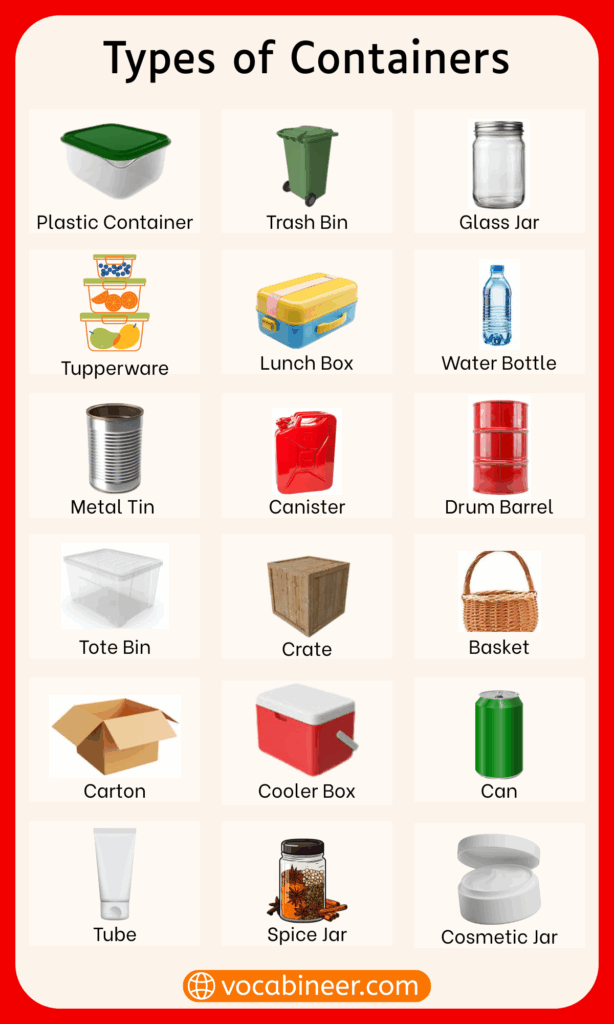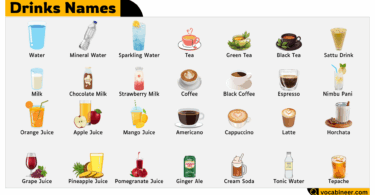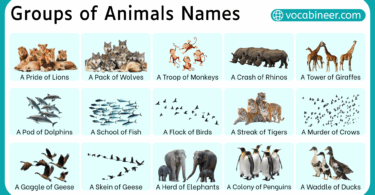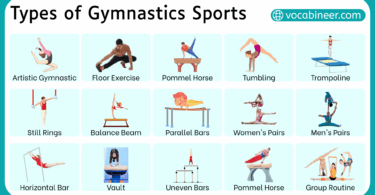Containers are storage items made to hold, carry, or protect different things like food, liquids, tools, or supplies. People use them in kitchens, bathrooms, labs, gardens, and many other places for safety and organization. This post helps you learn different types and names of containers with their pictures. Knowing container types helps talk about packaging, home needs, travel, and work in many fields.
In This Page
List of Food and Kitchen Storage Containers
Food containers are used every day in kitchens, lunch bags, pantries, and refrigerators to keep food fresh or packed.
Plastic Food Boxes and Containers: Lightweight boxes with tight lids for storing leftovers, snacks, or meal portions.
Glass Jars and Storage Bottles: Great for pantry staples like grains, spices, and sauces; they seal tightly and look neat.
Metal Tins and Canisters: Often used for cookies, tea, coffee, or dry ingredients; sturdy and reusable.
Ceramic Jars and Kitchen Canisters: Often decorative, these store sugar, flour, or salt and sit on kitchen counters.
Vacuum-Sealed Storage Containers: Remove air to keep food fresh longer; helpful for meal prepping or storing dry items.
Bento and Meal Prep Boxes: Divided boxes often used for organized meals, snacks, or kid-friendly lunch portions.
Lunch Boxes and Snack Boxes: Easy to carry containers used in schools, offices, or picnics for storing food.
Ice Cream Tubs and Dessert Containers: Freezer-safe containers for ice cream, frozen desserts, or leftover sweets.

Types of Containers Used for Liquids and Drinks
These are designed to store and transport liquids, beverages, or pourable items in homes and outdoor activities.
Reusable Water Bottles: Used to carry water, juice, or other drinks, made of metal or plastic.
Glass Jugs and Pitchers: Usually for serving water, juice, or milk at meals or events.
Plastic Water Pitchers: Lightweight and commonly used for filtered water or juices.
Thermos and Insulated Flasks: Keep drinks hot or cold for hours, great for coffee, tea, or soups.
Soda Cans and Drink Cans: Metal cans used for sodas, energy drinks, and fizzy beverages.
Milk Cartons and Bottles: Store fresh or long-life milk; come in paper, plastic, or glass.
Juice Boxes and Beverage Packs: Small, single-use boxes with straws, often packed in kids’ lunches.
Packaging and Shipping Containers Types
These containers protect items during delivery, shipping, or moving goods for long or short distances.
Corrugated Cardboard Boxes: Used for packing and shipping; sturdy with fluted layers for strength.
Wooden Crates and Boxes: Strong containers for heavy items like fruits, machines, or wine bottles.
Freight and Shipping Containers: Large metal boxes used on ships, trucks, or trains for transporting goods.
Travel Suitcases and Carry Boxes: Wheeled or handled boxes used for storing clothes or gear during travel.
Plastic Storage Bins and Totes: Large containers with lids, great for home storage or warehouse use.
Padded Bubble Mailers: Used for mailing fragile or soft items like electronics, jewelry, or cosmetics.
Industrial Drums and Barrels: Store chemicals, oils, or large amounts of liquid or bulk materials.
Bathroom and Toiletry Containers Names
Used for storing personal care items, cleaning liquids, and hygiene-related products.
Pump Bottles and Liquid Dispensers: Hold soap, shampoo, or sanitizer and release in small amounts.
Toothpaste and Cream Tubes: Squeezable containers for gel-like products used daily.
Soap Bottles and Dispensers: Refillable bottles with pump or press caps for liquid hand or body soap.
Cream and Lotion Jars: Small, wide-mouthed containers used for face creams, ointments, or balms.
Cosmetic and Makeup Bottles: Store foundations, serums, or facial oils; often come in dropper bottles.
Shampoo and Conditioner Bottles: Tall bottles used in bathrooms for washing and hair care.
Medical and Laboratory Containers
These types and names of containers are made for storing medicine, samples, and lab materials safely and cleanly.
Pill Bottles and Medicine Jars: Used to keep tablets, vitamins, or small medicines with child-proof caps.
Syringe Safety Containers: Hard bins where used syringes and sharps are placed safely.
Glass and Plastic Test Tubes: Long and thin tubes used to mix or heat liquids in labs.
Sample Jars and Specimen Containers: Sealable jars used for storing biological samples for tests.
Medical Waste Bags and Biohazard Containers: Colored bags and bins used to dispose of harmful or used medical materials.
Gardening and Household Storage Containers
These storage types are used for home maintenance, gardening tools, and cleaning supplies.
Flower Pots and Planters: Containers for soil and plants, used both indoors and outside.
Compost Bins and Garden Waste Containers: Hold kitchen scraps and plant waste for composting.
Tool Boxes and Utility Cases: Strong containers with handles to carry hand tools or small equipment.
Laundry Baskets and Hampers: Used to hold dirty clothes before washing or carry folded laundry.
Trash Cans and Dustbins: Used for throwing out garbage at home, in offices, or outside.
Water Buckets and Utility Pails: Useful for cleaning, watering, or carrying liquids.
Containers by Material Type
Containers are also grouped by what they’re made of. This helps decide their best use or look.
Glass-Based Containers: Transparent and durable, often used in kitchens or bathrooms.
Plastic Storage Containers: Common in all areas; light, strong, and come in many sizes.
Wooden Boxes and Holders: Great for home décor or storing dry items like letters, tools, or herbs.
Ceramic Pots and Jars: Used in kitchens or décor; good for storing dry or preserved foods.
Stainless Steel Containers: Durable and clean-looking, often used in lunch carriers or restaurants.
Paper-Based and Cardboard Containers: Disposable types for food takeaway, storage, or deliveries.
FAQs about Types of Containers
People use various containers like plastic boxes, glass jars, water bottles, cardboard boxes, and trash cans for food, drinks, storage, and waste.
A container is any item that holds things, including boxes, jars, and bottles. A box is a type of container, usually rectangular and used for storing or shipping.
Some common kitchen containers include glass storage jars, plastic food boxes, metal tins, and ceramic canisters for storing ingredients or leftovers.
Labs and medical settings use pill bottles, test tubes, specimen jars, and biohazard containers to store samples, medicine, or waste safely.
Containers are made of plastic, glass, metal, wood, paper, or ceramic. The material affects durability, use, safety, and what items they can store.
Read More




